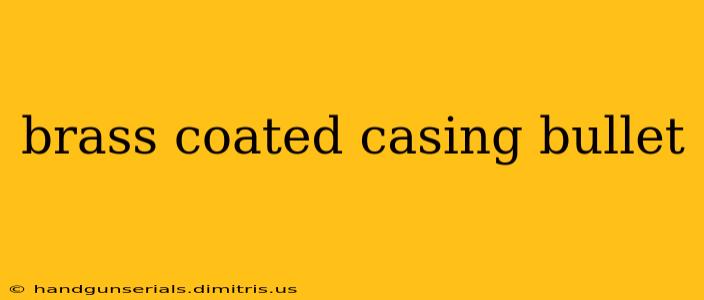Brass-coated casing bullets have gained significant popularity among shooting enthusiasts and professionals alike. This comprehensive guide delves into the specifics of these projectiles, exploring their construction, performance characteristics, and various applications. We'll uncover why they're a preferred choice for certain scenarios and address common misconceptions surrounding their use.
Understanding Brass-Coated Casing Bullets: Construction and Composition
Brass-coated casing bullets, unlike full-metal-jacket (FMJ) rounds, feature a lead core encased in a thin layer of brass plating. This plating is significantly thinner than the copper jacket found in FMJs, offering a distinct set of advantages and disadvantages. The manufacturing process typically involves electroplating a lead core with a layer of brass. The thickness of this plating varies depending on the manufacturer and intended application.
Key Differences from Full Metal Jacket (FMJ) Ammunition:
- Cost: Brass-coated bullets generally cost less than FMJ rounds, making them a more budget-friendly option for high-volume shooting practices.
- Plating Thickness: The brass coating is considerably thinner, resulting in a potentially softer projectile compared to the thicker copper jacket of FMJs.
- Performance: Performance characteristics can vary depending on the specific bullet design, powder load, and barrel characteristics. While generally suitable for target practice and plinking, their suitability for self-defense or hunting might be limited, depending on the specific application and desired performance metrics.
- Environmental Impact: The thinner brass plating raises questions regarding potential environmental impact compared to fully jacketed ammunition, requiring further research and analysis.
Performance Characteristics of Brass-Coated Bullets:
The performance of brass-coated bullets is influenced by several factors:
- Caliber and Grain Weight: The caliber (diameter) and grain weight (mass) significantly influence the bullet's ballistic properties, such as velocity, energy, and trajectory. Heavier bullets generally possess greater energy but lower velocity.
- Powder Load: The amount of propellant used directly impacts the bullet's muzzle velocity and overall performance. Higher powder loads usually result in higher velocities.
- Rifling Twist Rate: The rifling in the gun barrel imparts spin to the bullet, stabilizing it in flight. An appropriate twist rate is crucial for accurate shot placement.
- Barrel Length: Longer barrels generally translate to higher muzzle velocities due to more complete powder burn.
Advantages:
- Cost-Effectiveness: As mentioned, these bullets offer a significant cost advantage over FMJ ammunition, making them ideal for practice and high-volume shooting.
- Cleanliness: Some shooters report that brass-coated bullets lead to less fouling in the barrel compared to lead bullets, but this is highly dependent on the firearm and other factors.
Disadvantages:
- Accuracy: Due to the softer plating, brass-coated bullets may not provide the same level of accuracy as FMJ ammunition, especially at longer ranges.
- Durability: The thinner plating can be more susceptible to deformation or damage during firing, potentially impacting accuracy and consistency.
- Limited Applications: They may not be suitable for all applications, particularly those demanding high penetration or extreme accuracy.
Applications of Brass-Coated Casing Bullets:
Brass-coated bullets find their niche in specific applications:
- Target Practice: Their cost-effectiveness makes them perfect for high-volume shooting practice at the range.
- Plinking: Fun casual shooting, like plinking, benefits from the affordability of these projectiles.
- Certain Hunting Applications (with caveats): While not ideal for all hunting scenarios, they might be suitable for small game hunting at close ranges, but careful consideration of the game's size and ethical hunting practices is essential.
Conclusion: Choosing the Right Ammunition
Choosing the right ammunition depends heavily on the intended application. While brass-coated casing bullets offer a budget-friendly alternative to FMJ rounds, understanding their limitations is crucial. Their cost-effectiveness makes them excellent for target practice and plinking, but for applications demanding higher accuracy, penetration, and consistency, full metal jacket or other premium ammunition might be more appropriate. Always consult your firearm's manual and follow safe firearm handling practices.

